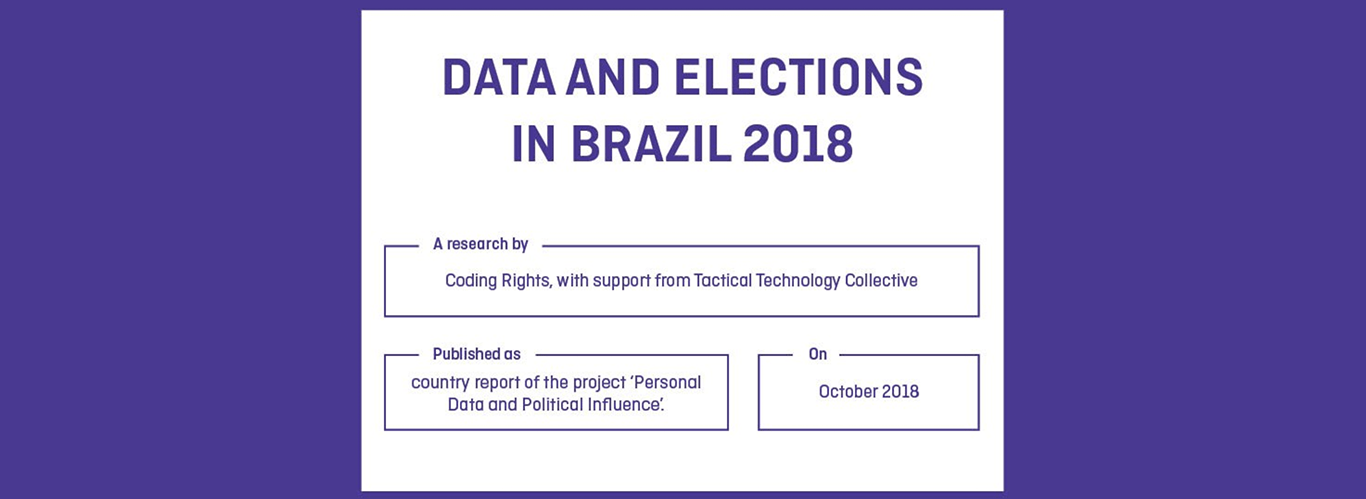Data as a tool for political influence in the Brazilian elections
#data protection #elections #misinformation #privacyIn a context of little data protection, political marketing uses profiling tactics to spread misinformation and deepen political polarization
Do you know if your personal information was used in any political campaign? Have you received any election content or been added to any Whatsapp group of any candidacies? Has your Facebook and Instagram been buried by electoral advertisements? Personal data have played an important role in the 2018 Brazilian election and we have started to investigate some practices of the influence industry.
In the past few months, the Brazilian people witnessed the election of the extreme right-wing candidate Jair Bolsonaro as their new president. Many factors have lead us to this situation. To try to understand part of this process, we have tried to investigate the role of personal data in political marketing strategies. Our findings are in the report “Personal data and political influence in preparation for the Brazilian elections of 2018”, a country study of a global project conducted by Tactical Tech Collective.
The 2018 Brazilian elections were the first ones to allow sponsored electoral content on the internet, including the search engine optimization. This unprecedented event has turned the web as one of the main battlegrounds for 2018 electoral marketing tactics, especially because of the new limitations on election time on TV and radio.
In 2014, social networks were already important. According to Facebook data, with 674.4 million interactions in three and a half months of campaigning, averaging 5.96 million per day, an election had never been so commented on that social network. The previous record was from India, averaging 3.28 million interactions per day. And on Twitter, 39.85 million messages were posted during the campaign. Through the use of bots, the polarization between the hashtags #Aecio45PeloBrasil and #DilmaMudaMais increased, bringing the Brazilian elections several times to the world trending topics.
In 2015, the Federal Supreme Court (STF) of Brazil declared corporate donations unconstitutional to electoral campaigns. As a result, the 2018 elections were the first in which presidential campaigns were prohibited from receiving any kind of financial support from private companies. However, other changes to the law have now allowed political parties, candidates and coalitions to advertise on blogs, instant messaging sites and similar applications on the Internet.
You may be wondering, but what’s the problem? Considering that voters have already been influenced, especially by television and web ads, promoting content on social networks, ad targeting practices, and personal data usage to improve and target online advertising can subject them to much more targeting and, on the other hand, potentially less access to information.
To understand how this dynamic works, strategists of digital campaigns were interviewed by our research. Their answers showed that the data industry combine public sources such as IBGE and large telecommunications and credit score companies — such as Vivo and Serasa Experian respectively. For example, our telephone numbers and email are used indiscriminately by political parties, campaign strategists or anyone who wants to buy our data.
In addition to Serasa Experian, four other companies specialized in analysing personal data of consumers, known as data brokers, were studied: Facemídia, Idea Big Data, Numbr Group and Ponte Estratégia — partner of Cambridge Analytica, company responsible for data collection and manipulation of information in targeted advertising (microtargeting) during Donald Trump’s campaign.
This broad industry of data brokers and advertising agencies has their business models based on lack of individual privacy and marketing of personal data without authorization.
All of this data, which includes detailed information about voters, such as WhatsApp contact phone numbers and socioeconomic profile, generates enough information to develop these agencies’ communication strategies through social media.
There is, therefore, a large imbalance in the methods and strategies of data acquisition that are being used in political campaigns digitally in Brazil and a lot of research need to be made to further understand this phenomenon, not only during elections but afterwards, once a complete scheme of communications based on data of citizens is already in place also to push political agendas of the far right government, probably in detriment of several fundamental human rights.
ABOUT THE PROJECT “PERSONAL DATA AND POLITICAL INFLUENCE”
This research is the Brazilian report developed by Coding Rights for the global project titled “Personal Data and Political Influence” by the Tactical Technology Collective, based in Berlin.
In collaboration with international partners, the project aims to expand understanding of key aspects and trends in the use of digital data and strategies in recent and/or future elections, currently focused on the global north. In addition to this report covering the Brazilian case, 13 other studies were produced by Tactical Tech: in Argentina, Canada, Chile, Colombia, France, Italy, India, Kenya, Malaysia, Mexico, Spain — Catalonia, the United Kingdom and the United States.
